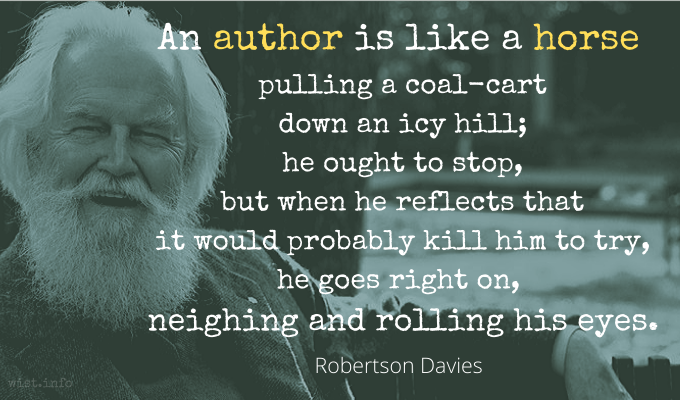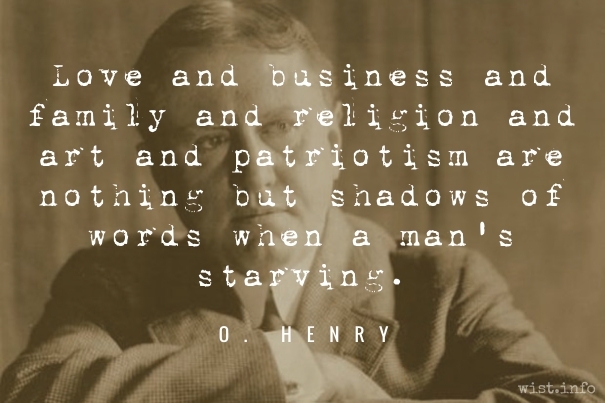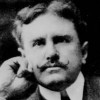SECOND MURDERER: I am one, my liege,
Whom the vile blows and buffets of the world
Have so incensed that I am reckless what
I do to spite the world.FIRST MURDERER: And I another,
So weary with disasters, tugged with fortune,
That I would set my life on any chance,
To mend it, or be rid on ‘t.William Shakespeare (1564-1616) English dramatist and poet
Macbeth, Act 3, sc. 1, l. 121ff (3.1.121-128) (1606)
(Source)
Quotations about:
desperation
Note not all quotations have been tagged, so Search may find additional quotes on this topic.
Give not thy Enemy Despair; for it is a weapon more dangerous than Valour it self.
Thomas Fuller (1654-1734) English physician, preacher, aphorist, writer
Introductio ad Prudentiam, Vol. 1, # 531 (1725)
(Source)
Hope is the feeling we have that the feeling we have is not permanent.
Mignon McLaughlin (1913-1983) American journalist and author
The Neurotic’s Notebook, ch. 5 (1963)
(Source)
Hunger never saw bad bread.
Benjamin Franklin (1706-1790) American statesman, scientist, philosopher, aphorist
Poor Richard (1733)
(Source)
But if my forces
are not enough, I am hardly the one to relent,
I’ll plead for the help I need, wherever it may be —
If I cannot sway the heavens, I’ll wake the powers of hell![Quod si mea numina non sunt
magna satis, dubitem haud equidem implorare quod usquam est:
flectere si nequeo superos, Acheronta movebo.]Virgil (70-19 BC) Roman poet [b. Publius Vergilius Maro; also Vergil]
The Aeneid [Ænē̆is], Book 7, l. 310ff (7.310-312) [Juno] (29-19 BC) [tr. Fagles (2006)]
(Source)
(Source (Latin)). Alternate translations:But if my own power not sufficient be,
Undaunted, aydes I'le seek where ere they dwell;
Will heaven not grant my sute, I'le raise up hell.
[tr. Ogilby (1649)]If native pow'r prevail not, shall I doubt
To seek for needful succor from without?
If Jove and Heav'n my just desires deny,
Hell shall the pow'r of Heav'n and Jove supply.
[tr. Dryden (1697)]But if my own divinity is not powerful enough, surely I need not hesitate to implore whatever deity any where subsists: if I cannot move the powers above, I will solicit those of hell.
[tr. Davidson/Buckley (1854)]If strength like mine be yet too weak,
I care not whose the aid I seek:
What choice 'twixt under and above?
If Heaven be firm, the shades shall move.
[tr. Conington (1866)]But if not enough my power,
I shall not pause to ask what aid I may.
And if I cannot bend the gods above,
Then Acheron I'll move.
[tr. Cranch (1872), l. 388ff]If my deity is not great enough, I will not assuredly falter to seek succour where it may be; if the powers of heaven are inflexible, I will stir up Acheron.
[tr. Mackail (1885)]But if of no avail
My godhead be, I will not spare to pray what is of might,
Since Heaven I move not, needs must I let loose the Nether Night.
[tr. Morris (1900), l. 310ff]If too weak
Myself, some other godhead will I try,
And Hell shall hear, if Heaven its aid deny.
[tr. Taylor (1907), st. 42, l. 372ff]If so weak
my own prerogative of godhead be,
let me seek strength in war, come whence it will!
If Heaven I may not move, on Hell I call.
[tr. Williams (1910)]But if my powers be not strong enough, surely I need not be slow to seek succour wherever it may be; if Heaven I can not bend, then Hell I will arouse!
[tr. Fairclough (1918)]So, if my power
Falls short of greatness, I must try another’s,
Seek aid where I can find it. If I cannot
Bend Heaven, I can raise Hell.
[tr. Humphries (1951)]Well, if my powers are not great enough,
I shall not hesitate -- that's sure -- to ask help wherever
Help may be found. If the gods above are no use to me, then I'll
Move all hell.
[tr. Day-Lewis (1952)]If my power
is not enough, I shall not hesitate
to plead for more, from anywhere; if I
cannot bend High Ones, then I shall move hell.
[tr. Mandelbaum (1971), l. 410ff]Well, if my powers fall short,
I need not falter over asking help
Wherever help may lie. If I can sway
No heavenly hearts I'll rouse the world below.
[tr. Fitzgerald (1981), l. 423ff]But if my own resources as a goddess are not enough, I am not the one to hesitate. I shall appeal to whatever powers there are. If I cannot prevail upon the gods above, I shall move hell.
[tr. West (1990)]But if my divine strength is not
enough, I won’t hesitate to seek help wherever it might be:
if I cannot sway the gods, I’ll stir the Acheron.
[tr. Kline (2002)]But if my powers
Are not great enough, why should I hesitate
To seek help from any source whatever?
If I cannot sway Heaven, I will awaken Hell!
[tr. Lombardo (2005)]If I cannot bend the gods, I will move Acheron.
[tr. @sentantiq (2012)]If my powers aren't enough, why not stoop to begging anyone? If I can't move the gods above, then I'll move Acheron.
[tr. Bartsch (2021)]If I cannot bend Heaven, I shall move Hell.
[Bartlett's]
Oft to the town he turns his eyes,
Whence Dido’s fires already rise.
What cause has lit so fierce a flame
They know not: but the pangs of shame
From great love wronged, and what despair
Can make a baffled woman dare —
All this they know, and knowing tread
The paths of presage, vague and dread.[… moenia respiciens, quae iam infelicis Elissae
conlucent flammis. Quae tantum accenderit ignem,
causa latet; duri magno sed amore dolores
polluto, notumque, furens quid femina possit,
triste per augurium Teucrorum pectora ducunt.]Virgil (70-19 BC) Roman poet [b. Publius Vergilius Maro; also Vergil]
The Aeneid [Ænē̆is], Book 5, l. 4ff (5.4-8) (29-19 BC) [tr. Conington (1866)]
(Source)
Elissa is an alternate name for Dido.
(Source (Latin)). Alternate translations:Viewing unhappy Dido's wals, which shone
With flames, the cause such fire had rais'd, unknown;
But what a woman might in sorrow drown'd,
Struck deep with grief and burning love was found;
And by sad auguries Trojans understand.
[tr. Ogilby (1649)]Then, casting back his eyes, with dire amaze,
Sees on the Punic shore the mounting blaze.
The cause unknown; yet his presaging mind
The fate of Dido from the fire divin'd;
He knew the stormy souls of womankind,
What secret springs their eager passions move,
How capable of death for injur'd love.
Dire auguries from hence the Trojans draw;
Till neither fires nor shining shores they saw.
[tr. Dryden (1697)]... looking back at the walls which now glare with the flames of unfortunate Elisa. What cause may have kindled such a blaze is unknown; but the thought of those cruel agonies that arise from violent love when injured, and the knowledge of what frantic woman can do, led the minds of the Trojans through dismal forebodings.
[tr. Davidson/Buckley (1854)]He saw the city glaring with the flames
Of the unhappy Dido. What had lit
This fire, they knew not; but the cruel pangs
From outraged love, and what a woman's rage
Could do, they know; and through the Trojans' thoughts
Pass sad forebodings of the truth.
[tr. Cranch (1872)]... looking back on the city that even now gleams with hapless Elissa's funeral flame. Why the broad blaze is lit lies unknown; but the bitter pain of a great love trampled, and the knowledge of what woman can do in madness, draw the Teucrians' hearts to gloomy guesses.
[tr. Mackail (1885)]... Still looking back upon the walls now litten by the flame
Of hapless Dido: though indeed whence so great burning came
They knew not; but the thought of grief that comes of love defiled
How great it is, what deed may come of woman waxen wild,
Through woeful boding of the sooth the Teucrians' bosoms bore.
[tr. Morris (1900)]... And backward on the city bent his gaze,
Bright with the flames of Dido. Whence the blaze
Arose, they knew not; but the pangs they knew
When love is passionate, and man betrays,
And what a frantic woman scorned can do,
And many a sad surmise their boding thoughts pursue
[tr. Taylor (1907)]... but when his eyes
looked back on Carthage, they beheld the glare
of hapless Dido's fire. Not yet was known
what kindled the wild flames; but that the pang
of outraged love is cruel, and what the heart
of desperate woman dares, they knew too well,
and sad foreboding shook each Trojan soul.
[tr. Williams (1910)]... looking back on the city walls which now gleam with unhappy Elissa's funeral flames. What cause kindled so great a flame is unknown; but the cruel pangs when deep love is profaned, and knowledge of what a woman can do in frenzy, lead the hearts of the Trojans amid sad forebodings.
[tr. Fairclough (1916)]His gaze went back
To the walls of Carthage, glowing in the flame
Of Dido’s funeral pyre. What cause had kindled
So high a blaze, they did not know, but anguish
When love is wounded deep, and the way of a woman
With frenzy in her heart, they knew too well,
And dwelt on with foreboding.
[tr. Humphries (1951)]He looked back at Carthage's walls; they were lit up now by the death-fires
Of tragic Dido. Why so big a fire should be burning
Was a mystery: but knowing what a woman is capable of
When insane with the grief of having her love cruelly dishonoured
Started a train of uneasy conjecture in the Trojans' minds.
[tr. Day-Lewis (1952)]... gazing
back -- watching where the walls of Carthage glowed
with sad Elissa's flames. They cannot know
what caused so vast a blaze, and yet the Trojans
know well the pain when passion is profaned
and how a woman driven wild can act;
their hearts are drawn through dark presentiments.
[tr. Mandelbaum (1971)]But he kept his eyes
Upon the city far astern, now bright
With poor Elissa's pyre. What caused that blaze
Remained unknown to watchers out at sea,
But what they knew of a great love profaned
In anguish, and a desperate woman's nerve,
Led every Trojan heart into foreboding.
[tr. Fitzgerald (1981)]... looking back at the walls of Carthage, glowing now in the flames of poor Dido's pyre. No one understood what had lit such a blaze, but since they all knew what bitter suffering is caused when a great love is desecrated and what a woman is capable when driven to madness, the minds of the Trojans were filled with dark foreboding.
[tr. West (1990)]... looking back at the city walls that were glowing now with
unhappy Dido’s funeral flames. The reason that such a fire had
been lit was unknown: but the cruel pain when a great love is
profaned, and the knowledge of what a frenzied woman might do,
drove the minds of the Trojans to sombre forebodings.
[tr. Kline (2002)]... he glanced back at the walls of Carthage
set aglow by the fires of tragic Dido’s pyre.
What could light such a conflagration? A mystery --
but the Trojans know the pains of a great love
defiled, and the lengths a woman driven mad can go,
and it leads their hearts down ways of grim foreboding.
[tr. Fagles (2006)]... gazing back at city walls lit up by the flames -- poor Dido's pyre. No one knew what caused the blaze, but they knew the great grief of a love betrayed and what a woman's passion could unleash. Their hearts were somber with foreboding.
[tr. Bartsch (2021)]
But let us die, go plunging into the thick of battle.
One hope saves the defeated: they know they can’t be saved![Moriamur et in media arma ruamus.
Una salus victis, nullam sperare salutem.]Virgil (70-19 BC) Roman poet [b. Publius Vergilius Maro; also Vergil]
The Aeneid [Ænē̆is], Book 2, l. 353ff (2.353-354) [Aeneas] (29-19 BC) [tr. Fagles (2006), l. 443ff]
(Source)
(Source (Latin)). Alternate translations:Then let's incounter death, fall bravely on,
Vanquish'd men's safety is to hope for none.
[tr. Ogilby (1649)]Then let us fall, but fall amidst our foes:
Despair of life the means of living shows.
[tr. Dryden (1697)]Let us meet death, and rush into the thickest of our armed foes. The only safety for the vanquished is to throw away all hopes of safety.
[tr. Davidson/Buckley (1854)]Come -- rush we on our fate.
No safety may the vanquished find
Till hope of safety be resigned.
[tr. Conington (1866)]Let us die,
And plunge into the middle of the fight.
The only safety of the vanquished is
To hope for none.
[tr. Cranch (1872)]Let us die, and rush on their encircling weapons. The conquered have one safety, to hope for none.
[tr. Mackail (1885)]Fall on a very midst the fire and die in press of war!
One hope there is for vanquished men, to cherish hope no more.
[tr. Morris (1900)]Forward, then,
To die and mingle in the tumult's blare.
Sole hope to vanquished men of safety is despair.
[tr. Taylor (1907), st. 47, l. 421ff]Let us fight
unto the death! To arms, my men, to arms!
The single hope and stay of desperate men
is their despair.
[tr. Williams (1910)]Let us die, and rush into the midst of arms. One safety the vanquished have, to hope for none!
[tr. Fairclough (1916)]So let us die,
Rush into arms. One safety for the vanquished
Is to have hope of none.
[tr. Humphries (1951)]Let us die, let us charge into the battle's heart!
Losers have one salvation -- to give up all hope of salvation.
[tr. Day Lewis (1952)]Then let
us rush to arms and die. The lost have only
this one deliverance: to hope for none.
[tr. Mandelbaum (1971), l. 477ff]Come, let us die,
We'll make a rush into the thick of it.
The conquered have one safety: hope for none.
[tr. Fitzgerald (1981), l. 470ff]Let us die. Let us rush into the thick of the fighting. The one safety for the defeated is to have no hope of safety.
[tr. West (1990)]Let us die and rush into battle.
The beaten have one refuge, to have no hope of refuge.
[tr. Kline (2002)]All that is left for us
Is to rush onto swords and die. The only chance
For the conquered is to hope for none.
[tr. Lombardo (2005)]Let us die even as we rush into the thick of the fight. The only safe course for the defeated is to expect no safety.
[Routledge (2005)]Let's die by plunging into war. Our only refuge is to have no hope of refuge.
[tr. Bartsch (2021)]
As long as we haven’t been able to abolish a single cause of human desperation, we do not have the right to try to suppress the means by which man tries to clean himself of desperation.
Antonin Artaud (1896-1948) French playwright, actor, director
“Sûreté générale: La liquidation de l’opium,” La Révolution Surréaliste (Jan 1925) [tr. L. Dejardin]
(Source)
Alternate translation: "So long as we have failed to eliminate any of the causes of human despair, we do not have the right to try to eliminate those means by which man tries to cleanse himself of despair." [tr. Weaver (1976)]
There are souls that are incurable and lost to the rest of society. Deprive them of one means of folly, they will invent ten thousand others. They will create subtler, wilder methods, methods that are absolutely desperate.
Antonin Artaud (1896-1948) French playwright, actor, director
“Sûreté générale: La liquidation de l’opium,” La Révolution Surréaliste (Jan 1925) [tr. L. Dejardin]
(Source)
KING : Am I the strongest or am I not?
BECKET: You are, today. But one must never drive one’s enemy to despair. It makes him strong. Gentleness is better politics. It saps virility. A good occupational force must never crush, it must corrupt.Jean Anouilh (1910-1987) French dramatist
Becket, Act 2 (1959) [tr. Hill (1961)
(Source)
The lines remain intact in Edward Anhalt's 1964 screenplay.
Things are never so bad that they can’t get worse. But they’re sometimes so bad they can’t get better.
Mignon McLaughlin (1913-1983) American journalist and author
The Second Neurotic’s Notebook, ch. 5 (1966)
(Source)
Want is a master which can sometimes make
A man the gravest sacrilege commit.[Perché il bisogno a dispogliar gli altari
ra’ l’uom talvolta, che sel trova avere.]Ludovico Ariosto (1474-1533) Italian poet
Orlando Furioso, Canto 43, st. 90 (1532) [tr. Reynolds (1973)]
Alt. trans.: "For man, alas, will sometimes disarray / The altar, when he finds himself in need ...." [tr. Rose (1831)]
Anxiety is love’s greatest killer. It creates the failures. It makes others feel as you might when a drowning man holds on to you. You want to save him, but you know he will strangle you with his panic.
Always in a moment of extreme danger things can be done which had previously been thought impossible. Mortal danger is an effective antidote for fixed ideas.
Erwin Rommel (1891-1944) German field marshal
The Rommel Papers, ch. 11 [ed. B. H. Liddell Hart, (1953)]
(Source)
No man was ever more than about nine meals away from crime or suicide.
Eric Sevareid (1912-1992) American journalist [Arnold Eric Sevareid]
“A New Kind of Leadership,” speech, Conference on Vision Care, Washington, DC (26 Apr 1974)
For more discussion of this and other closely parallel quotations, see: There Are Only Nine Meals Between Mankind and Anarchy – Quote Investigator.
However highly we must value courage and steadfastness in war, and however little prospect of victory there is for him who cannot resolve to seek it by the exertion of all his strength, still there is a point beyond which perseverance can only be called desperate folly, and therefore cannot be approved by any critic.
[Wie hoch auch der Wert des Mutes und der Standhaftigkeit im Kriege angeschlagen werden muß, und wie wenig Aussicht der zum Siege hat, der sich nicht entschließen kann, ihn mit der ganzen Kraftanstrengung zu suchen, so gibt es doch einen Punkt, über den hinaus das Verharren nur eine verzweiflungsvolle Torheit genannt und also von keiner Kritik gebilligt werden kann.]
Karl von Clausewitz (1780-1831) Prussian soldier, historian, military theorist
On War [Vom Kriege], Book 4, ch. 9 “The Battle: Its Decision [Die Hauptschlacht. Ihre Entscheidung],” (4.9) (1832) [tr. Jolles (1943)]
(Source)
(Source (German)). Alternate translations:However highly we must esteem courage and firmness in war, and however little prospect there is of victory to him who cannot resolve to seek it by the exertion of all his power, still there is a point beyond which perseverance can only be termed desperate folly, and therefore can meet with no approbation from any critic.
[tr. Graham (1873)]No matter how highly rated the qualities of courage and steadfastness may be in war, no matter how small the chance of victory may be for the leader who hesitates to go for it with all the power at his disposal, there is a point beyond which persistence becomes desperate folly, and can therefore never be condoned.
[tr. Howard & Paret (1976)]
It has been said that the love of money is the root of all evil. The want of money is so quite as truly.
Samuel Butler (1835-1902) English novelist, satirist, scholar
Erewhon, ch. 20 (1872)
See Bible, 1 Timothy 6:10
“At this festive season of the year, Mr. Scrooge,” said the gentleman, taking up a pen, “it is more than usually desirable that we should make some slight provision for the Poor and Destitute, who suffer greatly at the present time. Many thousands are in want of common necessaries; hundreds of thousands are in want of common comforts, sir.”
“Are there no prisons?” asked Scrooge.
“Plenty of prisons,” said the gentleman, laying down the pen again.
“And the Union workhouses?” demanded Scrooge. “Are they still in operation?”
“They are. Still,” returned the gentleman, “I wish I could say they were not.”
“The Treadmill and the Poor Law are in full vigour, then?” said Scrooge.
“Both very busy, sir.”
“Oh! I was afraid, from what you said at first, that something had occurred to stop them in their useful course,” said Scrooge. “I’m very glad to hear it.”
“Under the impression that they scarcely furnish Christian cheer of mind or body to the multitude,” returned the gentleman, “a few of us are endeavouring to raise a fund to buy the Poor some meat and drink and means of warmth. We choose this time, because it is a time, of all others, when Want is keenly felt, and Abundance rejoices. What shall I put you down for?”
“Nothing!” Scrooge replied.
“You wish to be anonymous?”
“I wish to be left alone,” said Scrooge. “Since you ask me what I wish, gentlemen, that is my answer. I don’t make merry myself at Christmas and I can’t afford to make idle people merry. I help to support the establishments I have mentioned — they cost enough; and those who are badly off must go there.”
“Many can’t go there; and many would rather die.”
“If they would rather die,” said Scrooge, “they had better do it, and decrease the surplus population. Besides — excuse me — I don’t know that.”
“But you might know it,” observed the gentleman.
“It’s not my business,” Scrooge returned. “It’s enough for a man to understand his own business, and not to interfere with other people’s. Mine occupies me constantly. Good afternoon, gentlemen!”
Charles Dickens (1812-1870) English writer and social critic
A Christmas Carol, Stave 1 “Marley’s Ghost” (1843)
(Source)
On the other hand, the cheapest form of pride is national pride; for the man affected therewith betrays a want of individual qualities of which he might be proud, since he would not otherwise resort to that which he shares with so many millions. The man who possesses outstanding personal qualities will rather see most clearly the faults of his own nation, for he has them constantly before his eyes. But every miserable fool, who has nothing in the world whereof he could be proud, resorts finally to being proud of the very nation to which he belongs. In this he finds compensation and is now ready and thankful to defend, “tooth and nail,” all the faults and follies peculiar to it.
[Die wohlfeilste Art des Stolzes hingegen ist der Nationalstolz. Denn er verrät in dem damit Behafteten den Mangel an individuellen Eigenschaften, auf die er stolz sein könnte, indem er sonst nicht zu dem greifen würde, was er mit so vielen Millionen teilt. Wer bedeutende persönliche Vorzüge besitzt, wird vielmehr die Fehler seiner eigenen Nation, da er sie beständig vor Augen hat, am deutlichsten erkennen. Aber jeder erbärmliche Tropf, der nichts in der Welt hat, darauf er stolz sein könnte, ergreift das letzte Mittel, auf die Nation, der er gerade angehört, stolz zu sein. Hieran erholt er sich und ist nun dankbarlich bereit, alle Fehler und Torheiten, die ihr eigen sind, mit Händen und Füßen zu verteidigen.]
Arthur Schopenhauer (1788-1860) German philosopher
Parerga and Paralipomena, Vol. 1, “Aphorisms on the Wisdom of Life [Aphorismen zur Lebensweisheit],” ch. 4 “From What One Imagines [Von dem, was einer vorstellt]” (1851) [tr. Payne (1974)]
(Source)
(Source (German)). Alternate translation:The cheapest sort of pride is national pride; for if a man is proud of his own nation, it argues that he has no qualities of his own of which he can be proud; otherwise he would not have recourse to those which he shares with so many millions of his fellowmen. The man who is endowed with important personal qualities will be only too ready to see clearly in what respects his own nation falls short, since their failings will be constantly before his eyes. But every miserable fool who has nothing at all of which he can be proud adopts, as a last resource, pride in the nation to which he belongs; he is ready and glad to defend all its faults and follies tooth and nail, thus reimbursing himself for his own inferiority.
[tr. Saunders (1890)]The cheapest form of pride however is national pride. For it betrays in the one thus afflicted the lack of individual qualities of which he could be proud, while he would not otherwise reach for what he shares with so many millions. He who possesses significant personal merits will rather recognise the defects of his own nation, as he has them constantly before his eyes, most clearly. But that poor beggar who has nothing in the world of which he can be proud, latches onto the last means of being proud, the nation to which he belongs to. Thus he recovers and is now in gratitude ready to defend with hands and feet all errors and follies which are its own.
[Source]
Never contend with a Man who has nothing to Lose.
[No empeñarse con quien no tiene qué perder.]
Baltasar Gracián y Morales (1601-1658) Spanish Jesuit priest, writer, philosopher
The Art of Worldly Wisdom [Oráculo Manual y Arte de Prudencia], § 172 (1647) [tr. Jacobs (1892)]
(Source)
(Source (Spanish)). Alternate translations:Never to engage with him that hath nothing to lose.
[Flesher ed. (1685)]Do not engage with him who has nothing to lose.
[tr. Fischer (1937)]Never compete with someone who has nothing to lose.
[tr. Maurer (1992)]
Necessity never made a good bargain.
Benjamin Franklin (1706-1790) American statesman, scientist, philosopher, aphorist
Poor Richard (1735 ed.)
(Source)























